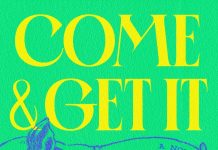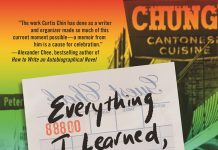Things werenât looking good for future novelist at the University of Michigan, where heâd begun his undergraduate studies in the late 1950s. After one particularly dire academic term, his GPA was 0.6, which is how the math worked out for his grades of two Fâs, one D, and an enigmatic FN.
âIt stood for âflagrant neglect,ââ says the finalist with a chuckle, sitting in front of one of the many bookshelves in his Montana home.
Partial redemption came at tiny Olivet College (now the University of Olivet), his next try at postsecondary education. Ever the raconteur, McGuane says he talked his way in, getting an audience with a dean and explaining his goal to be a writer.
âI told him I was reading Faulkner, and he asked me how many Faulkner novels I could name,â McGuane says. âI named all of them, and he said, âOK, youâre in.ââ
With better grades and a desire for more options, McGuane transferred to Michigan State University, where a handful of lucky breaks and new friendships â including one of the most famous, with fellow Michigander writer Jim Harrison () â set him on his way as a writer of novels, screenplays, and nonfiction essays on fishing. And short stories, which he has published in since the early 1990s.
Here, he talks about why his time in East Lansing was a lucky break, what happened when his childhood baseball hero Al Kaline found out McGuaneâs brother-in-law was Jimmy Buffett, and how Harrison stacked up as a fisherman.
Those grades in Ann Arbor ⦠were they an outlier?
My academic record was actually worse before I went to college. They were always trying to kick me out of Cranbrook, too. Iâd been kind of hanging in by a thread for a long time. It was staying with that one particular passion I had, literature, that saved my bacon.
You didnât think about the family business? Didnât your father run a Michigan auto supplier of some sort?
He started a business that came to be known as Tom McGuane Industries, but that was a grandiose name for what it was. The company made aftermarket parts for carburetors exactly when the industry was switching over to fuel-injection engines. Nobody wanted to be in the carburetor business, so he was in sort of a foolâs paradise for at least five years and was pretty successful.
Did you ever work for the business?
Superficially for one or two summers. My dad had an office on Fourth Street in Lincoln Park, and I worked there for a time basically doing shit work; then I did shit work at a Quonset hut down in Burr Oak. I just never had any interest in it. I was pretty hung up on being a writer from about the age of 14.
Do any experiences from your teen years in Michigan make it into your writing? Baseball sometimes comes up in some of your recent stories. Youâre famous for fishing, but were you a baseball player as a kid?
Oh yes, we were a baseball family, especially on my motherâs side. I played several positions, but mostly third base and pitcher.
What do you mean by âbaseball familyâ?
I had a great-uncle who played for the Boston Braves, and my motherâs first boyfriend, Birdie Tebbetts, was a catcher for several teams, including the Cleveland Indians. Later he managed the Indians. Whenever they came to town, all my little baseball buddies and I would go to Tiger Stadium, and heâd get us into the locker room to sit around with our heroes.
Detroit Tiger George Kell is in your story âHubcaps.â Was he one of your heroes?
I thought he was the best. Al Kaline, too. Never saw anyone fire balls into the infield like him. Several years ago, I wound up on a plane with a scout from the Tigers. We struck up a conversation, and Jimmy Buffett came up. Several weeks later, I got a letter from Al Kaline, who was on the Tigersâ administrative staff. Turns out Kaline was a huge Parrothead and wanted Buffettâs autograph.
What was your reaction?
I mean, I was, in some ways, disappointed. Hereâs a guy in his 80s, a hero of mine, and he wants me to get him Jimmyâs autograph. I couldnât put it together. It was unbelievable.
You told Jimmy in a last letter before he died to leave a little room, to leave the door ajar. What did you mean?
We all have the same craving for something else beyond all this. There is some intuition, maybe back to the Neanderthals, there is something more. Another reporter asked me what I was hoping for when I die. I told him, âA big surprise.â
In some ways, all your success was a surprise, at least given your start at the University of Michigan. Youâve done a lot as a writer â National Book Award nominee ( for Ninety-Two in the Shade), Hollywood (screenplays for films such as The Missouri Breaks starring Marlon Brando and Jack Nicholson), still under contract at The New Yorker. You left Michigan long ago, but why do you say MSU was a lucky break?
I wasnât a great student, though things got better when I could concentrate on my interests, which were literature and writing. At one point, I was trying to write but struggling, and I talked to my faculty adviser, Russell Nye, a Pulitzer winner. He saw how passionate I was and said, âThere are going to be a lot of pressures on you, financial and academic, to do something different than what you want to do. But youâre going to have to find a way to protect your work.â It was a vote of faith in what I might do. If youâre a young writer, you have no reason to believe what you are doing is very important. It looks like a waste of time to most people, including your parents.
Then I started meeting other students â Ron English, who would be Aretha Franklinâs guitarist for decades; the poet J.D. Reed; Tom Bailey, who later founded Janus Capital Group and became a billionaire; and of course Jim Harrison. My education wound up being in the hands of my fellow students. I later passed through Yale and Stanford, but I never met as many creative and interesting people as I did at Michigan State.
What was Harrison like in those days?
He was incredibly advanced compared to the rest of us goobers. Heâd been self-educated in literature since he was very young, and we were all kind of mesmerized. Plus, he was such a fun wild man. I had an old 1953 six-cylinder Ford that I sort of outfitted as a fishing car. Every free minute we got, Harrison and I would be Up North fishing in one river or another. We would hit all the bars until they closed at 2 a.m.; then weâd go stand out in the middle of a river waiting for the sun to come up. I donât know how we did it. We were just young and tough, or maybe still buzzed from the last bar and not hungover yet.
You guys famously stayed lifetime friends, so there was lots more fishing after those college days. Who was the better fisherman?
Oh, me by far. Carl Hiaasen says Harrisonâs version of fishing was to trail a woolly bugger behind the boat, chain-smoking cigarettes and talking nonstop. That was about right. But he loved it, and in that sense, he was a good fisherman.
This story originally appeared in the May 2024 issue of Â鶹·¬ºÅ Detroit magazine. To read more, pick up a copy of Â鶹·¬ºÅ Detroit at a local retail outlet. OurÌýdigital editionÌýwill be available on May 6.Ìý
|
| Ìý |
|








